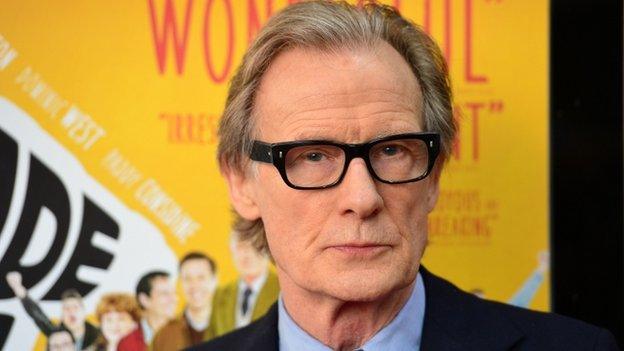People who inspired Pride tell their story
- Published
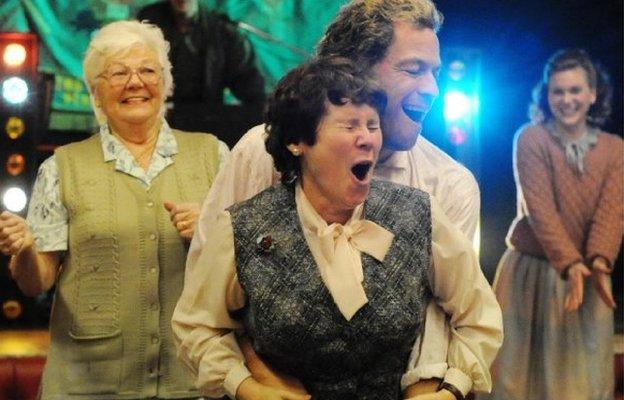
Dominic West plays Jonathan Blake in the film and is central to a favourite scene among audiences due to its exuberant dancing
The 1984 miners' strike was a bitter and divisive episode in modern British history. But with the film Pride, screenwriter Stephen Beresford has created a hit focusing on unexpected links between South Wales miners and a Lesbian and Gay group from London.
Released late last year, the film has been nominated for three Baftas, as well as a Golden Globe for best comedy.
Three of those who were part of the story in real life say they're delighted it's been discovered by a new generation.
Almost certainly Sian James is the only British politician to have been in demand at the Toronto Film Festival. But since the 1984 coal strike the Labour MP's life has been full of the unexpected.
"I was a 25 year-old wife fretting who had the whitest net curtains in the village," she says. "All I thought about was supporting my striking husband with virtually no cash coming in. I never dreamt that 20 years after that I'd become a Labour member of parliament.
"So who could possibly have thought another decade on I'd find myself briefing the Hollywood Foreign Press Association about the strike? They were fascinated. There were times in Toronto when it all seemed a bit surreal."
The publicists for Pride - directed by Matthew Warchus and written by Stephen Beresford - soon realised the real-life participants in the story were a big hit with the media. Two of the leading figures in the group Lesbians and Gays Support the Miners also went to Toronto and then the USA to beat the drum for the film.
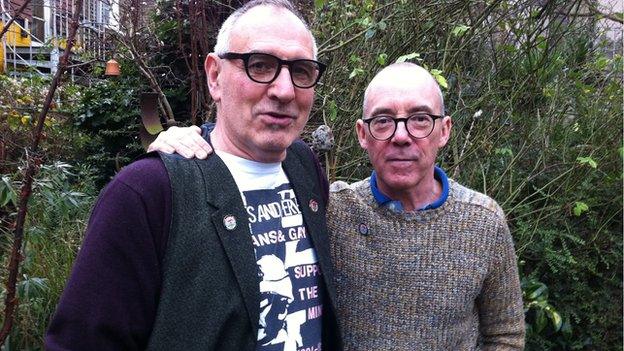
Jonathan Blake (left) and Mike Jackson have been heavily involved in spreading the word about the movie
Jonathan Blake, now 65, is a former actor played in the film by The Hour star Dominic West.
In 1984, he acknowledges, he was a slightly flamboyant presence in the Dulais Valley when a group of LGSM (Lesbian and Gays Support the Miners) members drove from London "in two Hackney Community Transport mini-buses and a clapped out old Volkswagen" to meet the families they'd offered to help financially.
"We got so lost that we arrived about one o'clock in the morning and it all felt a bit flat. I remember thinking we might have made a terrible mistake accepting the invitation to go and see how our money was being spent: how on earth would a mining community react to these strange people from London?
"The film is about 70% true and 30% invention - but Stephen Beresford is spot on showing how warm the welcome was from almost everyone. And oddly we felt the same warmth doing publicity at Toronto and in the States: it's obvious people like the story."
After Toronto, Blake went to talk about Pride in New York, Los Angeles and in San Francisco.
"In San Francisco we had a screening in the Castro, the main gay area. It was at a cinema in a shopping mall and at first I worried about the reception we'd get.
"Russell Tovey (who has a cameo role in the film) was in town making the HBO series Looking so he came over with some of the cast. We were kept as surprise guests until after the screening and people were delighted."
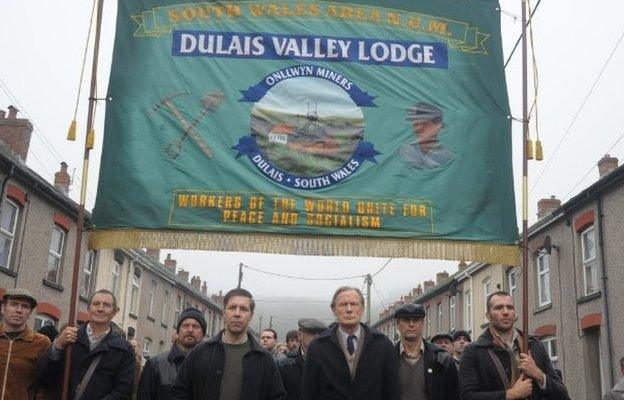
A member of the LGSM came from South Wales which led to the contact with the Dulais Valley miners support group
Mike Jackson has also been on the publicity trail in America. Thirty years ago he was instrumental in getting LGSM going.
"I was working as head gardener at Bedford College in Regents Park. In my spare time I was a volunteer at London Gay Switchboard and that's how I met Mark Ashton [played in the film by American actor Ben Schnetzer].
"Mark was very active in left-wing politics and massively energetic: he suggested we collect for the miners.
"At first where we sent the money was a bit like pinning a tail on the donkey. The important thing was to send the money direct to a support group because if you sent through the NUM it would have been lost as their funds had been frozen by the courts.
"Someone in LGSM came from South Wales so that's why we wrote to a miners' support group in the Dulais Valley - which in the movie Stephen changes to a telephone call. In retrospect it was a fortunate choice because the South Wales miners were organised and really efficient about getting big donors to spend time with them. And of course without that strange meeting of opposites there'd be no film today."
James says the fact their London visitors were gay wasn't a huge issue for most of the community. "I remember some giggling when the letter arrived but it didn't last. I pointed out that there was a lot of rubbish in the media about striking miners - so maybe everything you'd get in those days in newspapers about gays and lesbians was nonsense too.
"And during the strike you'd meet Swedish Euro-communists in the village and Maoists and all kinds of activists who wouldn't normally have come to places like Onllwyn. We were very used to strangers.
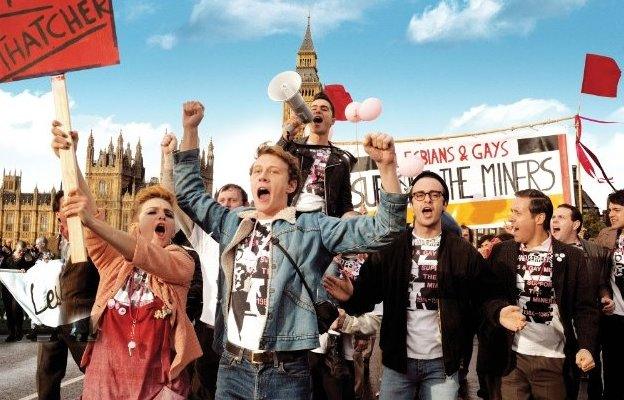
"I think it was rarer then for people - especially women - in a working village to engage with people from outside. For people like me it was an education to meet people who were different: the exact way they were different wasn't so important.
"Meeting all these people changed my life and without it I'm sure I'd never have spent the last 10 years as an MP."
Played by actress Jessica Gunning, James is seen in one of the film's highlights - a very 1980s dance which Blake launches into in the miners welfare hall.
"I can't claim my dancing was quite the big production number it became on screen," she recalls. "But that's the wonder of cinema: Stephen and Matthew made it true to the spirit of what happened."
Blake agrees that West's exotic moves to Shirley and Company's disco classic Shame, Shame, Shame might in reality have been a bit beyond him. "But it's a highlight with audiences. And you can see why people are already saying Pride would make a musical."
Jackson recalls that he and other LGSM members were in South Wales when the National Union of Mineworkers announced the strike was over and the miners would return to work.
"It was a national decision so they went back - but lots of people were unhappy at what happened. In that sense the miners lost and Stephen Beresford's too honest a writer to create a phoney upbeat ending.
"But Jonathan and Sian and I have spoken to people about the film in London and Toronto and in America. Audiences like the struggle and the sense of community at the heart of the story. They don't see what happened as a defeat."
- Published6 January 2015
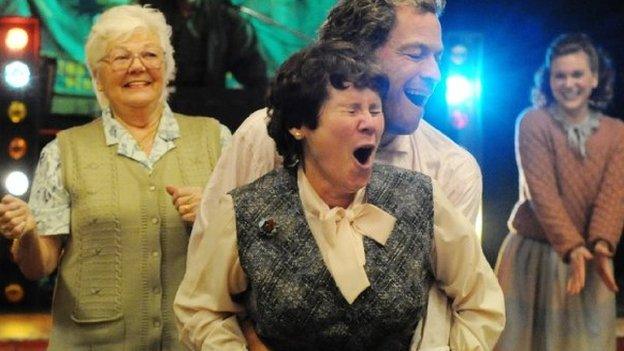
- Published7 December 2014
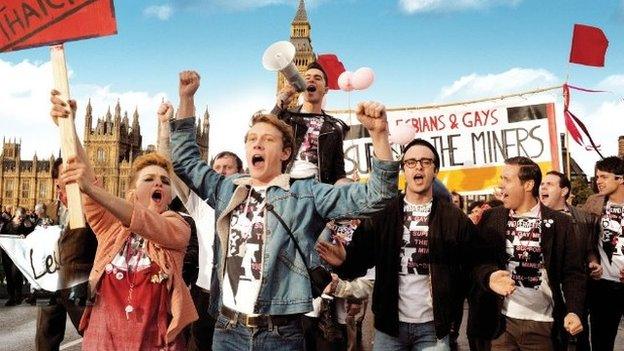
- Published13 September 2014
